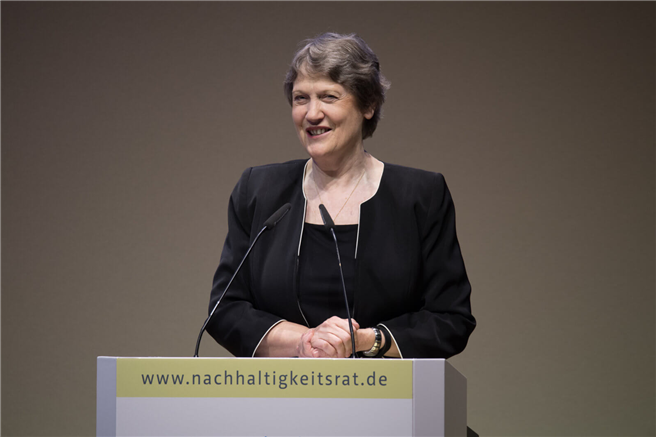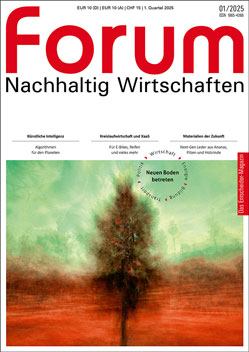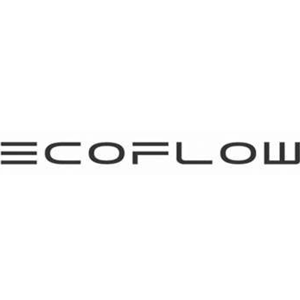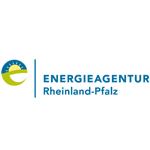Standpauke für Deutschland
Bei der Jahreskonferenz des Rates für Nachhaltige Entwicklung nimmt Helen Clark Deutschland ins Gebet
Deutschland ist gegenwärtig bei den meisten seiner strategischen Ziele „off Track", kritisiert Helen Clark, die Sprecherin der Peer Review Group und setzt fort: Ambition und Geschwindigkeit der Umsetzung der Nachhaltigkeitsziele sollten hierzulande massiv erhöht werden. Sie fordert Deutschland auf:
 moving towards zero net land degradation;
moving towards zero net land degradation; - reversing the trend on biodiversity losses;
- phasing out fossil fuel and nuclear energy generation and putting even more emphasis on driving a global change to achieve sustainable energy for all;
- achieving a circular economy; and
- promoting informed public debate on why achieving sustainable development is critical for Germany and the wider world.
Den gesamten Wortlaut der Gardinenpredigt präsentieren wir Ihnen gerne im englischen Wortlaut direkt von der Konferenz:
Chair of the German Sustainable Development Council,
Distinguished guests,
Ladies and gentlemen.
It is my pleasure today to present to you formally the report of the International Peer Review Group on the German Sustainable Development Strategy.
Let me say on behalf of all members of the team that we consider it a great privilege to have been invited to undertake this task. We did so in the belief that what Germany does on sustainability is of global importance, not least because of the size of its economy and population. When major countries move on sustainable development, that is felt around the world.
We thank all those who interacted with us during the review: The Chancellery for its support for our work; and all those who met with us: government officials, Members of Parliament, members of the German Council for Sustainable Development (RNE), and representatives of the private sector and civil society. Meeting with such a wide range of actors greatly enriched our understanding of the sustainability challenges and opportunities for Germany. Our work was greatly facilitated by Gunther Bachmann and Veronica Tomei at RNE and their team.
Now let me proceed to our findings and recommendations. They are premised on our group’s view that Germany is well positioned to achieve the Sustainable Development Goals (SDGs) and its own Sustainable Development Strategy (GSDS) which flows from them. We acknowledge that Germany has been producing official Sustainable Development Strategies since 2002, acting well in advance of most countries. It has developed an institutional architecture which can drive the current Strategy forward, and it has the wealth, the access to relevant technologies, and the stakeholder engagement to back that effort.
- That view underlies our first recommendation: that, rather than reinvent the whole wheel, Germany should "keep what works, elevate what is good, and change what has failed to deliver”.
In pursuit of that, the country will need to address its off-track indicators quickly, and both recognise new and emerging threats to sustainability and strengthen its capacity to respond to those. It also needs to expand communication and engagement efforts – we perceive that sustainable development here is often seen as being focused on environmental issues, and that civil society actors in the social and economic spheres do not always see the Sustainable Development Strategy as speaking to them.
- On the institutional architecture for sustainable development, the Peer Review Group believes that it is very positive that the top level of the Federal Government, the Chancellery, drives the Strategy. We were also encouraged that the new Coalition Government Agreement supports the continuation of sustainable development strategies. At this relatively early stage of the Government’s term in office, we believe it is important for its leading figures to send strong signals of commitment to advancing the Strategy, and to consider anchoring sustainable development principles in the German Constitution.
- Raising the level of ambition for what Germany can achieve: this is a key recommendation. While recognising that progress on the majority of the Strategy’s targets is currently off- track, the Peer Review Group feels that the Strategy needs to be more ambitious. In particular, we agreed that ambition and the speed of progress should be lifted on:
- moving towards zero net land degradation;
- reversing the trend on biodiversity losses;
- phasing out fossil fuel and nuclear energy generation and putting even more emphasis on driving a global change to achieve sustainable energy for all;
- achieving a circular economy; and
- promoting informed public debate on why achieving sustainable development is critical for Germany and the wider world.
- Leaving No One Behind is a core principle of the 2030 Agenda and the SDGs. As such, it invokes the need for both local and global solidarity. The latter can be advanced through Germany’s Official Development Assistance budget. Among those to whom we spoke, however, there was some concern expressed that more people are being left behind in Germany itself. Sensitive policy responses which engage communities will be needed to ensure ongoing social cohesion and solidarity amidst the growing diversity of the Population.
Overall, we are living in times of great turbulence including in the world of work and in what is happening to our climate and broader environment. Governments worldwide must endeavour to provide both direction and policy frameworks which help citizens, the private sector, and other actors adapt in this era where volatility is the new normal and where sustainable development is an imperative. The Peer Review Group reiterates the message of the 2013 Peer Review that there will not be future competitiveness without sustainability.
- Strengthening the Federal Government’s central co-ordination capacities: As observed earlier, the institutional architecture to guide the Sustainable Development Strategy is sound with the Chancellery providing leadership and a State Secretaries’ Committee convened to drive implementation. Yet, with 29 of the 63 Sustainable Development Strategy indicators off-track, the practical results are not as good as they could be. That calls for a redoubling of efforts. The Peer Review Group recommends that:
- the State Secretaries' Committee should meet regularly around a strong action programme;
- off-track indicators need to be addressed through departmental action plans for which departments are accountable;
- the departmental co-ordinators of the Sustainable Development Strategy need their work better resourced; and
- efforts towards sustainable procurement and operations across the government system should be intensified, and more ways should be found to support the exchange of best practice on sustainability at all levels of government and throughout the economy and society.
- The role of Parliament: While the Parliamentary Advisory Council on Sustainable Development has been established for twelve years, it does not have the power and status of a parliamentary standing committee. The Peer Review Group recommends that it should be transformed into a more powerful committee which scrutinises progress on the Sustainable Development Strategy closely and focuses in particular on the off-track indicators. We also suggest that a way be found to reflect the Strategy in the Government’s Budget.
- The German Council for Sustainable Development was established in 2001. It has the capacity to convene stakeholders and advise government on cross-cutting issues of sustainability. It has the right to pursue an independent agenda, which is best practice for such organisations worldwide. The Peer Review Group believes its role could be strengthened. Specifically, we suggest that:
- more use is made of the Council's capacity to convene across the wide range of actors in German society;
- the Council should intensify its advocacy to business and institutions in urging that they make their footprint sustainable and report back to the public using the Sustainability Code; and
- there should be an evaluation of the current status of the Council with consideration being given to giving it a legal entity status which better fits its independent profile.
- Revamping communication of the Strategy: The Peer Review Group acknowledges that while achieving sustainability is complex, it should be possible to communicate both Germany’s own Strategy and the Global Goals (SDGs) effectively. Across society and the economy, individual citizens, companies, and civil society need good information about what they can do to support Germany to make progress. We observe that the concept of sustainability has deep roots in German society, and that the concept of the social market economy and its tradition of dialogue here are also positive for tackling major challenges. We therefore have recommended that the Government:
- establish a budget line for communications about sustainable development and a strategy to inform and
- engage the broader public and the civil servants and other public employees responsible for driving progress on the Strategy;
- encourage and support citizens, companies, and other organisations to publicise the sustainability steps engage strategically in the German Sustainability Awards which highlight best practice.
- Enhancing capacity for systems thinking and education for sustainability: Strategising on sustainability requires a capacity to see the big picture of how economic and social systems and natural ecosystems interact.
- To build a broader understanding of the challenge, education about sustainable development needs to be incorporated at all levels of the education system and through life long learning. It is particularly important that politicians and officials grasp the opportunities, the risks, and the changes needed in order to be able to participate in informed debate and decision-making.
- A science platform has been made part of the German Sustainable Development Strategy, and the scope of research expenditure has been broadened, including by internationalising it to enable access by partners with the aim of supporting implementation of the 2030 Agenda more broadly. This is very positive.
- We recommend that research should also explicitly focus on Germany’s off-track
indicators to support finding solutions, and on emerging challenges.
- Tracking progress on the Strategy’s indicators: The Peer Review Group places great emphasis on the importance of indicators and measurement of progress on them. We suggest that:
- the Strategy's indicators are kept under close review to ensure that they remain relevant and steer progress;
- off-track indicators are addressed rapidly with actions which can get them back on track;
- the national statistical office and data-tracking processes should have their funding expanded to ensure data adequacy;
- ensuring comparability with European Union indicators would be useful; and that
- The decision of the International Organisation of Supreme Audit Institutions (INTOSAI) Congress in Abu Dhabi in 2016 on the monitoring of progress on the SDGs by national audit institutions should be taken into account. Specifically, INTOSAI proposes that the national institutions should explore the preparedness of national governments to implement the SDGs, undertake performance audits on the SDGs, and contribute to implementation of SDG16 which envisages effective, accountable, and transparent institutions. It emphasizes the importance of including external stakeholders in the audit process.
- Dealing with emerging issues and applying the GSDS’s principles to Germany’s global interactions.
The Peer Review Group believes that Germany needs to address the issues of sustainable production and consumption more directly. It notes that Germany’s trade patterns have an impact for better or worse on value chains in many developing and emerging economies. It recommends that
- Germany should internationalise its domestic approaches to sustainable supply chains. In this respect it recommends that Germany should review its overall footprint, large parts of which are beyond its borders;
- the principles of the GSDS should be integrated more formally into bilateral political consultations, development partnerships, and multilateral engagement; and that
- Germany should continue to work to ensure that new and emerging challenges to sustainable development are addressed at the United Nations and in other international contexts. The Group noted that Germany has encouraged collective action for sustainable development among G20 countries, and believes that policy coherence for sustainability across the G20 membership should continue to be strengthened.
In conclusion:
The discussions which the Peer Review Group had internally and with German stakeholders were very rich and were conducted over a number of months. We determined that our report should be a practical one, focusing on what needs to be done to accelerate progress on the Strategy. We were concerned about progress on the majority of indicators being off track, but believed that, even so, ambition for the Strategy could be greater.
We consider that we were privileged to be part of the Peer review process, and we gained many nsights from it which we will each be able to share more widely in our various capacities. It is a bold move to open up a core Government strategy to independent international review as Germany has now done on three occasions. We recommend this practice to all countries as a way of helping to strengthen implementation of the 2030 Agenda, the Sustainable Development Goals, and national sustainability strategies.
Our Group believes that Germany’s Sustainable Development Strategy provides a sound basis for a transformational sustainability agenda. The challenge now is to demonstrate that that matters for jobs, prosperity, and shared values. Germany has the capacity to define its identity as a nation dedicated to sustainable development, including by drawing on its strengths in social dialogue to engage all citizens in the quest to achieve that and take great pride in it. Thank you for your attention.
Gesellschaft | Politik, 04.06.2018

Pioniere der Hoffnung
forum 01/2025 ist erschienen
- Bodendegradation
- ESG-Ratings
- Nachhaltige Awards
- Next-Gen Materialien
Kaufen...
Abonnieren...
03
JAN
2025
JAN
2025
48. Naturschutztage am Bodensee
Vorträge, Diskussionen, Exkursionen mit Fokus: Arten-, Klima- und Naturschutz
78315 Radolfzell
Vorträge, Diskussionen, Exkursionen mit Fokus: Arten-, Klima- und Naturschutz
78315 Radolfzell
17
JAN
2025
JAN
2025
Systemische Aufstellungen von Familienunternehmen und Unternehmerfamilien
Constellations machen Dynamiken sichtbar - Ticketrabatt für forum-Leser*innen!
online
Constellations machen Dynamiken sichtbar - Ticketrabatt für forum-Leser*innen!
online
06
FEB
2025
FEB
2025
Konferenz des guten Wirtschaftens 2025
Mission (Im)Possible: Wie Unternehmen das 1,5-Grad-Ziel erreichen
80737 München
Mission (Im)Possible: Wie Unternehmen das 1,5-Grad-Ziel erreichen
80737 München
Professionelle Klimabilanz, einfach selbst gemacht

Einfache Klimabilanzierung und glaubhafte Nachhaltigkeitskommunikation gemäß GHG-Protocol
Megatrends
 Eindämmung der Barbarei durch Kultur
Eindämmung der Barbarei durch KulturAngesichts der aktuellen Zahlen über die Zunahme der Sexualstraftaten und Femizide nimmt Christoph Quarch v.a. die Männer in die Pflicht
Jetzt auf forum:
Profiküche 2025: Geräte-Innovation spart mehr als 50 Prozent Energie für Grill-Zubereitung ein
Sichere Abstellmöglichkeiten für Fahrräder:
Fotoausstellung Klimagerecht leben
Ohne Vertrauen ist alles nichts
The Custodian Plastic Race 2025
Niedriger Blutdruck: Wie bleibt man aktiv, ohne sich schwindlig zu fühlen?
















